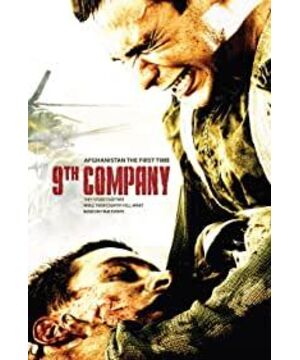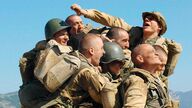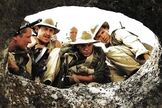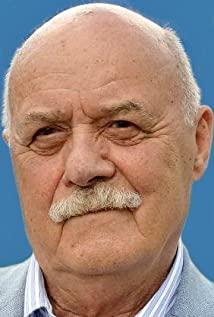The film "The Ninth Company" was one of the major events in Russian film, culture and even the country in 2005. The film was not only warmly welcomed by the broad audience, becoming the champion of the Russian film box office in 2005 ($25 million, topping all other foreign films in the top 10 box-office charts, ranking first), but also in the 2005 Russian Academy of Film Academy " "Golden Eagle Award", "Nika Award" and newspaper review "Golden Sheep Award" three awards have won the best film and other awards. Film director Fyodor Bondarchuk was also named "Person of the Year 2005" by People magazine for the film's box-office success. The hero of the Soviet Union, the head of the 345th Independent Guards Airborne Corps, was awarded the award by Admiral Valery Vastrotin himself. More importantly, for the first time in history, then Russian President Vladimir Putin brought together the chief creator of the film crew and Defense Minister Ivanov, as well as Shvedkoy, who was in charge of culture and film, and Shah, the general manager of the Moscow Film Studio Group Corporation. Nazarov and several veterans of the Afghan war were invited to their official residence to watch the film together. Putin made a positive evaluation of the film: "a very successful film", "everything is in life". Praise the actor's performance: "Very talented, so it is deeply rooted in the hearts of the people." "I am not afraid to express the Russian army in a big style and excellent tradition. There is both character and self-sacrifice here, and it is very ornamental. It should be affirmed. Although "there are no expansive battle scenes here, but in terms of the emphasis on psychological depiction, the film is very powerful, and it is a very serious work that really shows the war and the people. These people behaved in the extreme conditions of this war. people respect."
The film describes the events of the war in Afghanistan, based on the real events of the 9th Company of the 345th Airborne Corps of the Soviet Union in Afghanistan, showing the bravery and sacrifice of Soviet soldiers in the face of the enemy. It is said that the ninth company is a legendary airborne detachment in the Afghan war. It was once called the "punishment company" because the people who entered this company were basically problem youths. However, this company was the one with the most heroes in the war in Afghanistan. The author's use of "The Ninth Company" as the title of the film obviously has a certain symbolic meaning.
However, the protagonist in the film is not like the troubled young man in the ninth company. The real events of the 9th Airborne Company, which is the basis for the creation of the film, are also not as depicted in the film. The real incident is that the ninth company was not forgotten when it held on to the 3234 high ground in the "main line" battle, but after a brutal and fierce battle, most of the soldiers were injured when the reinforcements arrived, and a few people died. In this way, the treatment at the end of the film is undoubtedly the director's artistic processing. The director has publicly stated that this film is not a documentary, so the principle of documentary cannot be used to request it.
As for why he chose the war in Afghanistan as the film's narrative, the director made it clear: first, he wanted to make a big-style film, and it was a film about the war, because war is still one of the main themes of popular blockbusters in the world today. Second, he wanted to express the brotherhood and collective spirit that only young people tend to develop, and these things happen to be embodied in the military. Bondarchuk has said more than once: The age group of 18 to 20 is the easiest and most passionate period for young people to enter blindly. "The young people at this time have some common life principles and potential ideals, that is, comradeship, brotherhood, and a sense of community. War can best embody these sacred and pure concepts." Especially under the education of the Young Pioneers and the Communist Youth League at that time, these concepts were especially important in the army. Therefore, it is said that "this age group is also the most suitable for the state apparatus." He himself felt the same way when he was 18 as a signal soldier in a cavalry company. It is out of the memory of his youth that the author decided to make this film to tell today's young people about the "ideal and heroic world that only young people could have" about the ideal and heroic world they experienced at that time. It can be said that "The Ninth Company" is a film "about love, about comradeship, and brotherhood", "It's a song I dedicated to our generation and the 18-year-old me, because I was in that hallucination. I have lived and felt very comfortable in that fantasy world.”
Taking the war in Afghanistan as a narrative is also a critique of the war. As we all know, the decade-long war in Afghanistan was an embarrassing and painful page in its history for the Soviet Union and Russia, just as the Vietnam War was for the United States. After watching the movie, President Putin said: "This is a tragic event in the life of our country and our people." On that battlefield, there were many casualties of Soviet soldiers. Not only did they become victims, they were killed, captured, or maimed. They have also become murderers, brutalizing Afghan civilians. For the war in Afghanistan, after the disintegration of the Soviet Union, there were two completely different views. One opinion is that this war is necessary, it is "the consideration of the national interests by the old men of the Kremlin", especially from the perspective of today's world structure and geopolitics. Another view is that this war is wrong, it is an aggression against Afghanistan and a crime against the Afghan people. In particular, the latter view was recognized by most people, and it was also expressed in literary and artistic works after the disintegration of the Soviet Union. In the early 1990s, there were several films that reproduced the actual situation of the war in Afghanistan, revealing the failure of the Soviet army in Afghanistan. Most of these films question and criticize the war itself and the initiators of the war through the experiences of the participants in the war in real life and on the battlefield. Director Nikita Gagunov's film "Legs" (1991) questions the originator of the war through the tragic fate of two friends who went to war in Afghanistan: one was killed and the other was wounded with a leg amputated. In a scene in the film, the protagonist's brother, visiting his brother's return, slammed his head into the carriage of the train, scolding those who made his brother lose his leg, those who started the war. Wrath of Afghanistan (1991), directed by Vladimir Baltko, describes events that took place at the end of the war. New to Major Bondura's Airborne Corps to experience life, Captain Steklov has truly realized the horrors of war in Afghanistan: Don't watch the soldiers drinking and chatting during the day, but all sleeping with guns at night. During one mission, he was exposed prematurely due to his inexperience and was seriously injured. Major Bondura was also killed in an attack on a village hidden by resistance elements. Bek Mambetov's "Waltz of Peshawar" (1994), using the technique of documentary film, through the interviews of American journalists to the prison, showed the riot of a group of Russian prisoners of war in Peshawar prison. Personality Variation and Psychological Distortion. After being unable to escape, having no way to seek help, and completely shattering his desire to return to his relatives in the motherland, he faced death and completely lost his moral standards and behavioral norms. They were moody, irrational, and hated each other until they died. These films have different plots and different atmospheres, but The fate of the characters is the same, and the ending is tragic. The director's position is also extremely obvious, revealing and criticizing the speculators and initiators of the war. Since these films were rarely shown publicly at the time, it was difficult to reach a large audience.
Bondarchuk's film is also a reflection and criticism of the war, and also shows the tragic ending of the war. Although the film does not give a specific account of the historical background and progress of the war, it just selects a section of several recruits from enlistment to sacrifice on the battlefield to narrate, but in the ending narrative of the film, "two years later, we will The nations that fought for the war have disappeared, and it is no longer fashionable to wear the medals of superpowers that no longer exist", in the Captain's remarks in his military class that "no one can defeat Afghanistan at any time", and Bondarciu Kerr's own statement that "our generation has been forgotten" is a clear denial of the war. It's just that Bondarchuk reflected and criticized the war, and different from the above films, it also showed the process of the boys growing into men through the war, showing the brotherhood and the friendship forged by the Soviet soldiers during the war. The courage to face the enemy is another theme of the film.
The film begins with a group of 18-year-old children enlisting in the army, through basic tactical training at the training center, to going to Afghanistan until they die on the battlefield, reappearing the tragic fate of this generation of soldiers. The author's description of the people in the play, whether it is training or confronting the enemy, is more infused with bravery, camaraderie and brotherly love. The director has said more than once that he wants to show the eternal themes of betrayal and bravery shown by young soldiers on the edge of life and death, and the friendship of men, and that he hopes to convey the main thing through the film - the psychology of that era. state". Perhaps it is this kind of spiritual fighting spirit and comrade-in-arms feeling that people looked forward to recovering, which existed earlier and then gradually disappeared, which made the film recognized by the vast audience, especially young people. Videos worth watching. It's a pity that these young men who have become men all died on the battlefield in Afghanistan for that senseless war. However, they overcame personal fears and frailties during their service, and their spirit and behavior to show camaraderie and comradeship left a deep impression on the audience and moved them deeply.
The film's criticism of the war is shown in the fact that most of the young men who stood on the highlands died, but only one was spared. These young men of bravery and camaraderie died because they were caught in the quagmire of this endless war. The reason for this is that the war in Afghanistan was indeed a quagmire that the Soviet army could not step into. According to Russian newspapers, the Soviet Union sacrificed more than 15,000 people in the war in Afghanistan. It is precisely because of this that the boys who stick to the 3234 Heights in the film have been unable to contact the base in the brutal and fierce battle, waiting for reinforcements to arrive, because the troops who received the order to withdraw at that time were eagerly withdrawing. And this urgency just reflects the psychology of the Soviet army wanting to get out of this war quagmire and to end this meaningless war.
At the beginning of the film, Leng Guang shot a low-key farewell scene. In the rain, several protagonists reluctantly bid farewell to their families and friends, which has laid the groundwork for the war, or the tragic fate of the boys. In the second half of the film, the boys' lives and battles on the battlefield in Afghanistan justify the tragic end of the war. It can be said that the film has done a good reproduction of the war quagmire of the Soviet army in Afghanistan in terms of narrative. The first is the first tragic scene the boys saw at the airport after arriving in Afghanistan. In the video, the recruits who just landed at Kabul Airport were waving goodbye to the veterans who were about to be demobilized when they returned home, watching their planes take off, congratulating them from the bottom of their hearts that they could go home soon, when suddenly the plane was shot, crashed and exploded, destroying everyone and everything on board. . This tragic scene made the recruits who had just set foot on the land of Afghanistan already felt the horror of the war, and also revealed the plight of the Soviet army in Afghanistan. Despite the deployment of fighter jets, helicopters, anti-aircraft guns, sappers and demining police dogs on the airfield, and various strict protection measures, it was still unable to stop the surprise attack of the Afghans.
The next few important plot paragraphs are also reenactments of the sinister environment of the war. Afghanistan is located in the mountains, and the steep mountains are a natural barrier for themselves, and a quagmire and trap for outsiders. In the film, the recruits pass through and wherever they go, they are all deep in the mountains. And the sudden attack of the enemy also makes you hard to guard against, and you can only cope with it. This is also the main reason why Soviet soldiers called local resisters "ghosts". He beats you in the back, but you have trouble finding him. In the film, when the convoy was attacked, Warrant Officer Huo Hall led Liut and others to chase the "ghost" who had disappeared suddenly to the cave, which reminded people of the traps that the Vietnamese dug in the bamboo forest during the Vietnam War. The rugged mountain road that the painter Qiao Kangda and the Afghan men walked into the village to get matches can not help but make people tremble and horrified. Maybe at some point, a ghost will jump out from somewhere to attack you, or shoot you with a black gun, and you don't even have a place to hide and escape. Especially the death of Stas, he did not need to be wary of the child, but when he turned around, he was shot to death by the child. The scene of Stas's sacrifice, with Afghan cottages in flames in the background by the bombardment of Soviet "hail" shells, and in the foreground Stas twitches, moans, and finally closes in the arms of Lyut and Vorobey, who are crying in despair. opened his eyes, though Vorobiei held his eyelids with his fingers to keep them from closing. This scene not only shows the quagmire in which the Soviet army is in, but also reveals the suffering and psychological pressure that the war brought to both sides. Until the last scene, Qiao Kangda just came to the edge of the cliff with a picture clip at dawn, and was killed by the "ghost" who approached silently, and the brutal and bloody fighting followed, until all the personnel of the company died. , are reproductions of the sinister environment of war.
It was in the most treacherous environment that the heroic spirit and brotherhood of the soldiers came to the fore. As mentioned earlier, the reason why the film attracted the audience's love is that the director reflected on the war and at the same time showed the brave spirit of the soldiers, showed the comradeship and comradeship between the soldiers, and showed them. The process of growing from a lad to a real man in the extreme conditions of war. So how does the director express these things, and how does it impress the audience?
The film shows the growth and transformation of these young men in the army and the bravery they finally showed, from the recruits enlisted in the army, receiving training, going to Afghanistan to being sacrificed on the battlefield, and creating a group of lifelike soldiers. It also reproduces the solidarity of this generation of soldiers.
In terms of structure, the film consists of two major parts: the pre-war recruit training and the actual exchange of fire on the battlefield. The linearly structured plot, which appears to be a chronicle of their day-to-day life after enlisting in the army, is full of poignancy and excitement. Recruit training is like purgatory. Under the severe training of Warrant Officer De Gallo, who has suffered a shock to his brain and a single and stubborn personality, they have endured unbearable physical training: climbing mountains with heavy loads, wading long distances, and over walls. Bridge and Military Skills Training: Shooting, Fighting, Trench Covert, Crawling, etc. The battlefield in Afghanistan is a real hell. The boys and the enemy started gun-to-gun live ammunition, with bullets flying past their ears and leaving scratches on their helmets. Later, they fought face-to-face until they sacrificed one by one, reappearing the dirty cruelty of war and the brave and tenacious young men.
The character creation is also unique. The people in the play seem to be equal, there is no priority. Everyone has his own function, his own personality, his own social role and national attributes. Seven young men with different personalities and lives in the film (the timid and cowardly Vorobiei, the painter Qiao Kangda who loves to philosophize, Qiu Gong who loves to make jokes, Liut who grew up in the nursery school, and the honest and quiet Stas) Simple and cunning, passionate and complex, full of lofty spirit but down-to-earth, they became close comrades-in-arms in the war, plus Warrant Officer De Gallo who trained them, and Hoholl who fought with them constitute the group portrait of the film, It also constitutes the collective image of that generation of soldiers.
Vorobiei was a philosophy teacher at St. Petersburg Normal University before enlisting in the army, and has a beloved girl. Because of his poor physique and weak personality, he passed out twice at the recruit training point, and suffered more pain and scorn than anyone else. He once wanted to stay in China, but when he saw the eyes of his comrades, he gave up the idea automatically. Although he was a little scared on the battlefield, he finally detonated the grenade and perished with the enemy, showing his bravery. Liut grew up in a nursery school, has strong autonomy, and never forgives others. Although he looked down on Vorobey's cowardice, he helped him everywhere. He tried hard to persuade Vorobiei to have sex with Snow White, which seemed to be instigating, but actually wanted to eliminate his cowardice and strengthen his courage. The reason why Liut survived by himself despite the sacrifice of all the people was because of the amulet given to him by his fellow villagers at the airport, and more because he had the ability to command battles and be good at fighting. During military training, he gave the idea to lead the second team to defeat the first team is an obvious example. Although Chugong loves to speak one-liners, bullies Vorobieyi everywhere, and is sometimes hated by his companions, he has shown extreme bravery and fearless spirit in the struggle against the enemy. The same is true of the other young men. They usually fight and abuse each other, sarcastic and ironic, and they can stand up at critical times. In the face of the enemy, they have consistently shown the spirit of heroism, tenacity, and fighting to the end. One review read: "It's not about our country losing the war, it's about these lads winning their own war. This war is fought among every man. Every man has to decide for himself what love is. , what is mutiny, what is comradeship, what is merit." These children did it, they maintained their friendship in battle, they established merit on the battlefield, and they did not lose their positions. Although only Liut was left alive, "we held our ground and the team could pass" was their collective achievement.
The veterans in the film are also extraordinary. The warrant officer at the recruit training point strictly trains recruits with a very harsh attitude, punching and kicking them, shouting, and "turning them into people with their own hands", the only purpose is to hope that they will learn to kill the enemy, learn to Protect yourself, be adaptable on a real battlefield, deal with sudden enemy attacks, and learn to survive in brutal combat and extreme environments. His hysteria seemed understandable, because in a battle he once commanded, an entire platoon was sacrificed, and he was the only one who survived. With guilt for the victims and hatred for the enemy, he wrote many applications to return to Afghanistan, but was rejected again and again. The psychological pain can be imagined.
Director Bondarchuk himself played the role of Hohall, although he was strict with the recruits and reprimanded them at every turn, but he took care of them everywhere and taught them experience. Especially the nostalgia for the sacrificed comrades in arms reveals his rough and subtle emotions. There is also Kurbash, a sanitation worker, who is dying, but is still giving spiritual comfort to the soldier who has broken his leg. There are also fellows of Liut, who voluntarily gave the amulet to Liut. It was the mutual care of these people that established the brotherly fighting camaraderie. It is their emotion and their bravery and sacrifice that moved and won the audience.
Another reason for "The 9th Company" to win audiences is its compelling visuals. The images shot with high-definition cameras and the sound recorded in the PINEWOOD studio in the United Kingdom endow the film with excellent visual effects, with clear picture and realistic sound. According to the Hollywood model: the narrative strategy composed of scale, mood, and melody, the special effects created by montage and special effects photography make the film more attractive and highly enjoyable. The scenes of the training base are all three-dimensional. The regions of Afghanistan are more local. In the film, the blue sky and white clouds present the high altitude of the plateau; the mist-shrouded peaks and the mountains form a distinct layering; the steep mountains and vertical and horizontal ravines, arid deserts and dry air, and stone tops highlight the geography of Afghanistan. Features: mountains, plateaus, deserts. Afghan airport, spent 450,000 US dollars to shoot the scene of the airport plane explosion, which gave people a strong visual impact. The tragic scene of the plane crash, the explosion of oil barrels, and the chaos of the airport are vivid in my mind; the car of the convoy was destroyed by the explosion. , the scene of the tank being paralyzed, the tank cover being blown off, and the scene of the dust cloud formed by the bombed mud covering the entire position in the final battle all reveal the bloody, cruel, absurd and unpredictable nature of the war, as well as the tragedy faced by the soldiers. ending.
In the film, the eve of the soldiers' departure to Afghanistan, they meet in the warehouse with the only female "Snow White" they see in the camp. Among the crowd, under the call of the painter Qiao Kangda, "Mermaid, the eternally pure prostitute, the goddess...", in the hazy colors and the powerful and emotional music, the soldiers who were photographed by the photographer from the panoramic perspective are together. The scene of kneeling at her feet in unison is like a ceremony, not only the recognition of the boy growing up, but also the worship of Snow White. Because "Snow White" gave her everything to the soldiers. The image of "Snow White" in the film was almost unanimously recognized by critics.
One reviewer wrote: "The 9th Company is not fictional. Everything here is fitting, everything - laughter and fear, shouting and whispering, stupidity and despair, death and life are in proportion. Here There are clichés, but there is no speculation or excess." "The film is honest, not an honest record of real events, but an honest work of art." Many critics have compared it with the famous films "Field Platoon" and "Modern Modern" Apocalypse", "The Deer Hunter", and even "The Dawns Here Are Quiet" are more positive.
"The 9th Company" is Fyodor Bondar, the son of the famous Russian film director Sergei Bondarchuk ("War and Peace", "A Man Who Happened", "They Fight for the Motherland", etc.) Chuuk's directorial debut. Fyodor Bondarchuk was born in 1967 and served as a signal soldier in the cavalry regiment. After graduating from the Directing Department of the Soviet State Film Academy in 1991, he engaged in commercial production and participated in film and television performances. He is not only a successful advertising man, a famous actor, but also a TV host, winning a TV award in 2003. Now a famous figure in Russian cinema.
View more about 9th Company reviews










